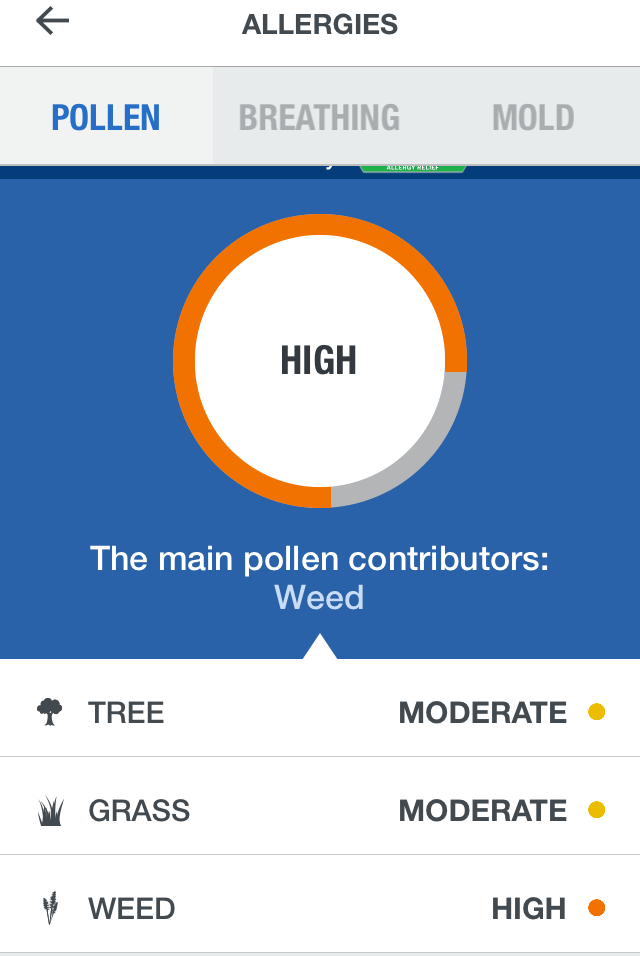Ugh, Seasonal Allergies.
As you can see below, if you suffer from seasonal allergies and live in the Wichita, KS area, you probably aren’t feeling 100%. Unfortunately, this area can be a hot zone for all different types of allergens and if that wasn’t bad enough, they can reappear more than once a year. Seasonal allergies, also known as hay fever or allergic rhinitis, affects all age groups. (Fun fact: rhinitis is irritation of the nose and rhinoceros means “nose horn;” in case you were curious!) Anyway, common symptoms include sneezing, congestion, itchy/watery eyes, and coughing. Typical treatment includes antihistamines, decongestants, and steroids.

Inflammation
Most people are aware of the process of inflammation in the context of an injury. For example, a sprained ankle may be red, painful, swollen, and even hot. These symptoms indicate the body’s inflammation process is bringing repair cells to the injured area for healing. The cells get to work rebuilding the damaged tissue and when the process is complete, the swelling, redness, heat and pain subside. A similar process occurs with seasonal allergies. Your body sees pollen, dust, ragweed, tree buds, etc. as threats, so it mounts an inflammatory response to neutralize that particular threat. Because these allergies are airborne, tissues exposed to air most (eyes, nose, throat) are the main sites of inflammation. Your body is doing its job, as annoying as that may be.
Got Milk?®
If you are a sufferer of seasonal allergies and your answer to the above slogan is “YES, absolutely!” then you might be working against your own body. The majority of people are not equipped to properly digest the protein and sugar contained in cow’s milk. Furthermore, if you do contain the enzymes necessary, human tendency is to become less tolerant to milk ingredients as you age. Inflammatory reaction to milk is present in the population majority, not the minority.
What does this have to do with a runny nose? Well, if the majority of people consuming dairy products suffer from systemic inflammation, it is comparable to someone giving you a rug-burn on your already sunburnt arm. Dairy exaggerates the pain, mucous production, congestion, and overall yucky feeling that comes with allergies.
Life Without Dairy
I know I won’t be your favorite person for telling you to cut out dairy products, but try it - at least during times you know seasonal allergies affect you. This means no: milk, cheese, ice cream, yogurt, and don’t forget coffee creamer you avid coffee drinkers! Don’t look at this from the standpoint of giving up something; on the bright side, you may gain: freedom from bloating, constipation, diarrhea, acne, decreased hormone and antibiotic consumption, and if this doesn’t sound like enough, email me for more =).
Alternate Options
- Milk - organic and carageenan-free: coconut, almond, oat
- Cheese - goat, feta, nutritional yeast, even cashew!
- Yogurt - fermented, with actual cultures is good for your gut (sorry, Yoplait is NOT included in that); low sugar
- Ice Cream - make your own out of frozen bananas, coconut milk-based, local business Little Lion Ice Cream!
Takeaways
- Allergens are common in the Wichita, Kansas community.
- Symptoms of seasonal allergies are products of inflammation.
- For the majority of the population, consuming dairy products cause low-grade, systemic (body-wide), inflammation.
- Milk + a predisposition to allergic rhinitis = increased mucous production, congestion, fatigue, and digestive issues.
- Do yourself a favor and drop the dairy. Try an alternative!
About the author
Dr. Rachel Sparks is the co-founder of ICT Muscle & Joint Clinic, a board-certified chiropractor, and functional medicine expert. The core of Dr. Sparks’ beliefs lies within the ability to move often and to move well. Dr. Rachel Sparks is passionate about improving the scope of care available for the pregnant and postpartum women through her integrative approach of chiropractic, rehab, nutrition, and functional health.
